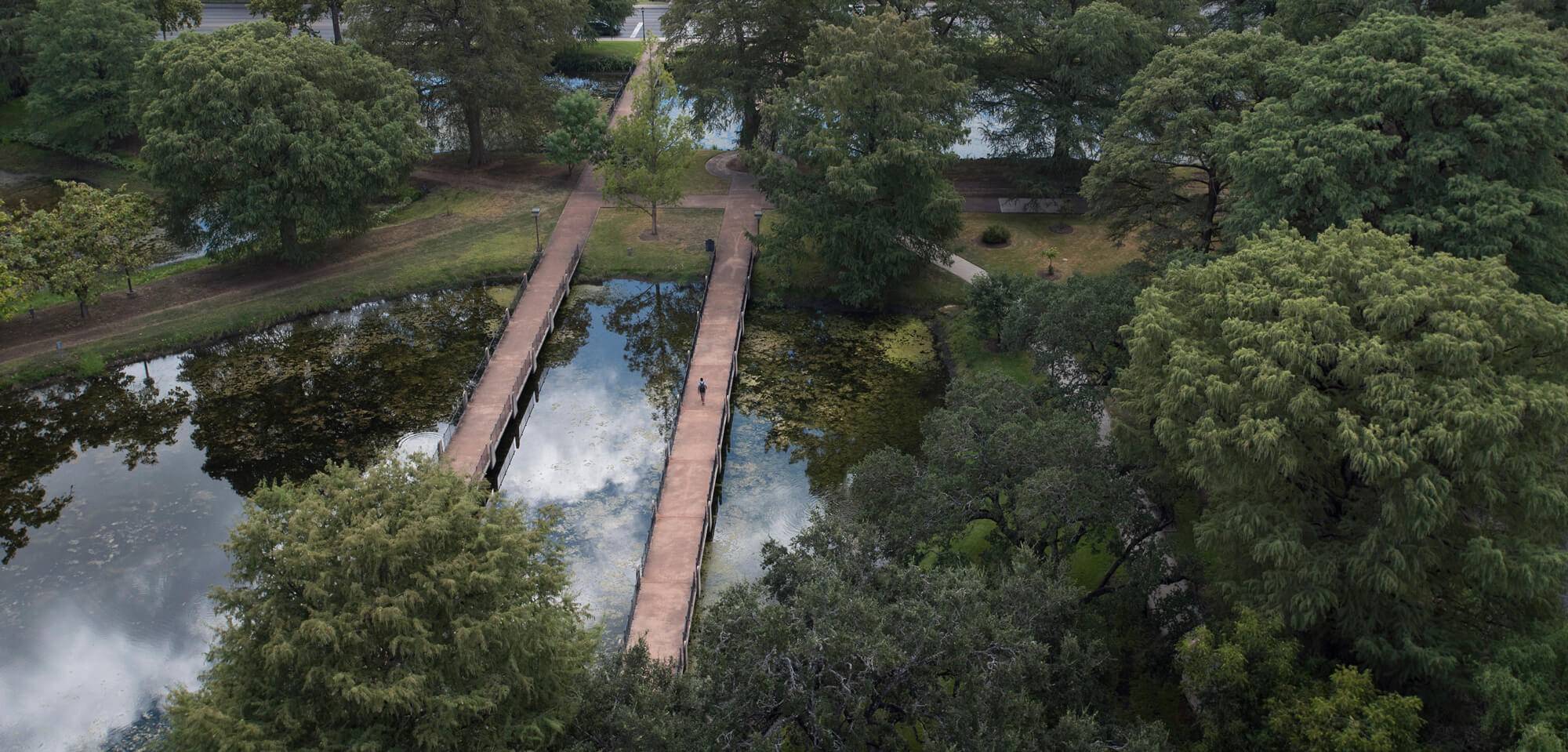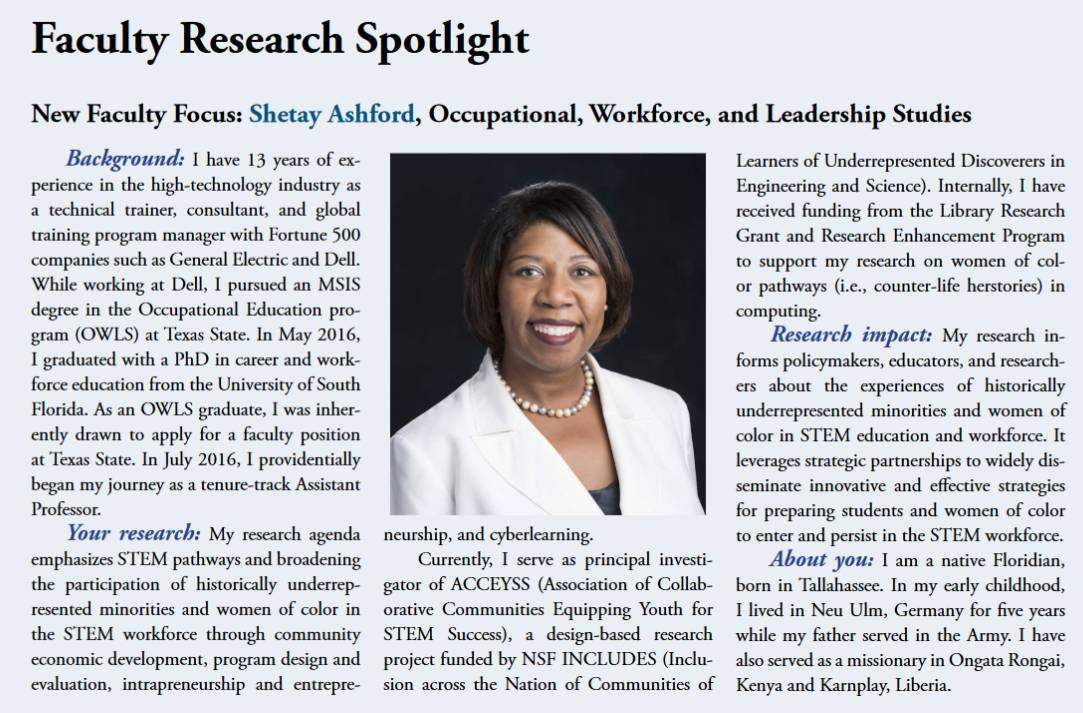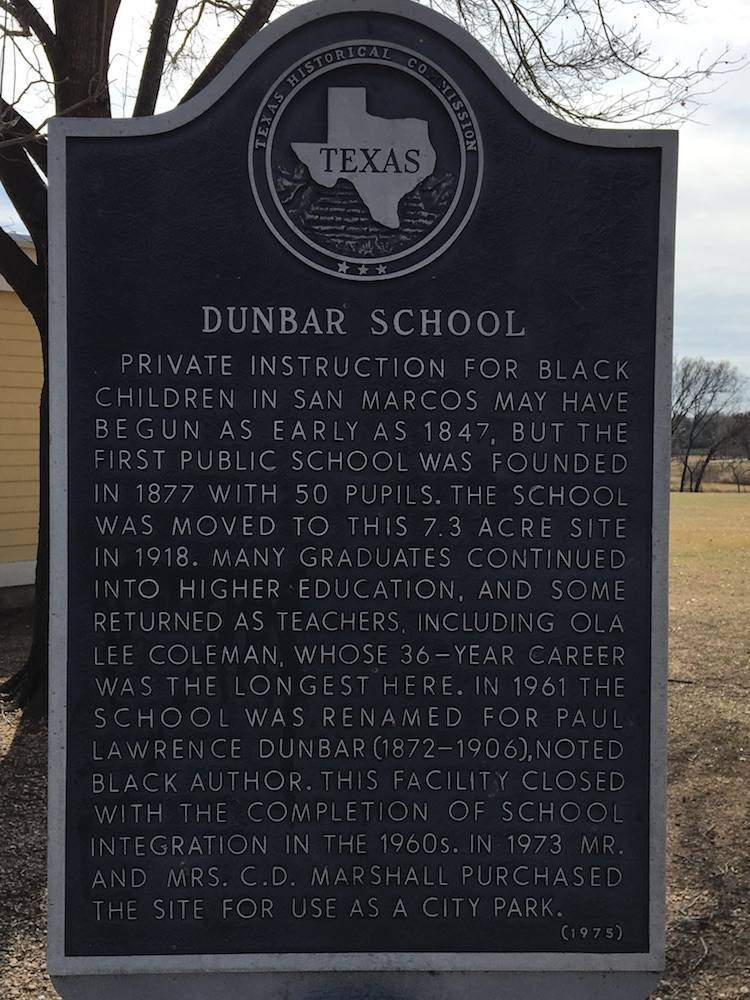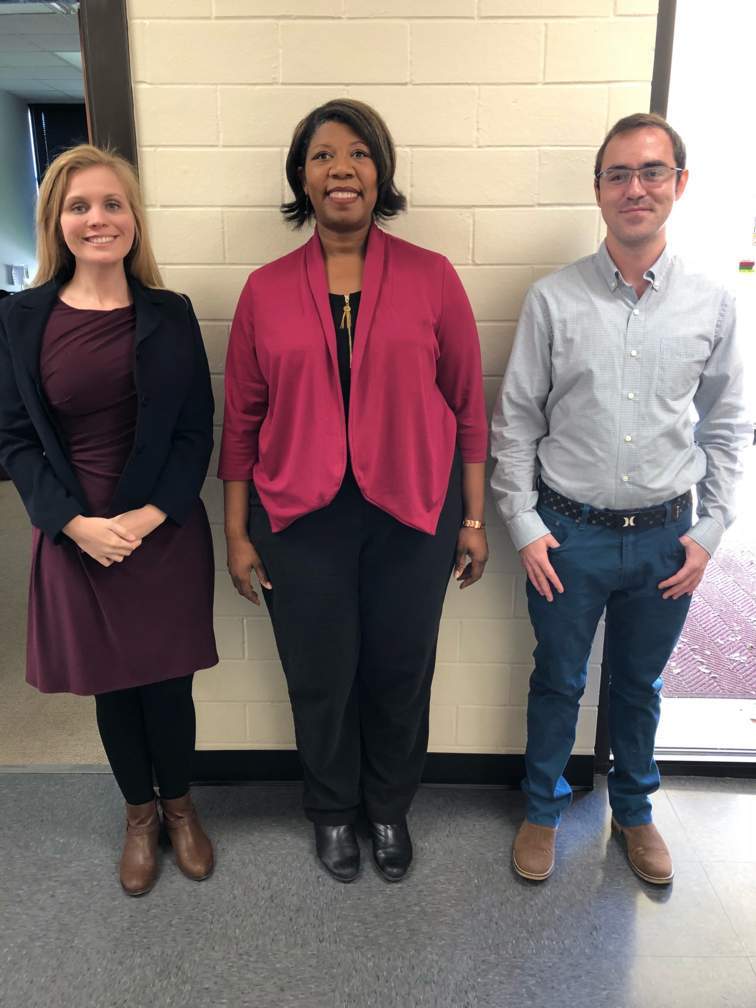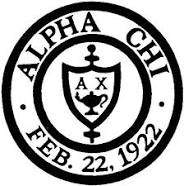2018 News
-
Texas State University Philosophy Dialogue Talk - Housing & Gentrification with Dr. Ashford-Hanserd
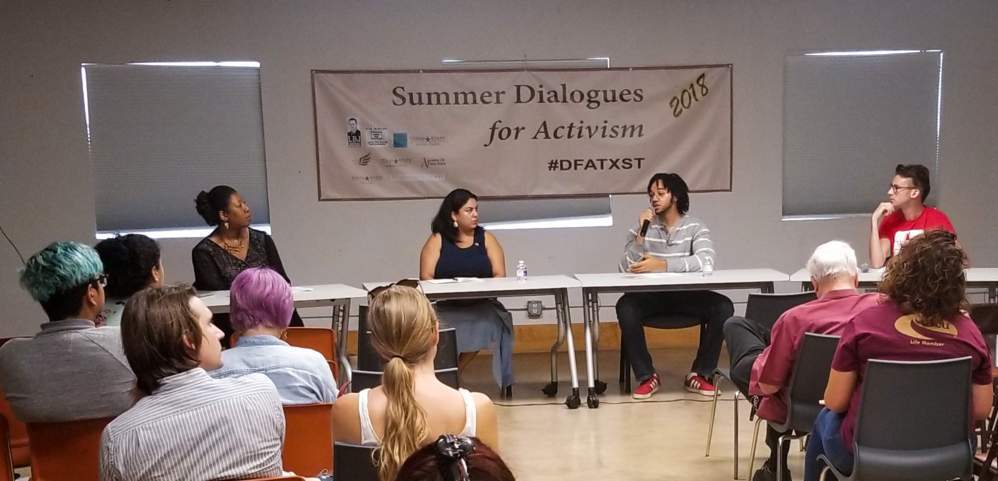
Housing activists from San Antonio and a social equity scholar from Texas State University led a conversation about "Gentrification" at Dialogues for Activism, Friday (6/22/18) at 9:00 a.m. at the LBJ Museum of San Marcos.
The dialogue on "Gentrification" was moderated by San Marcos activist Tomas de Leon. The session was emceed by Diann McCabe. The panel featured housing activists Marlon Davis and Salena Santibañez, and equity scholar Dr. Shetay N. Ashford-Hanserd.
Jo Ann Carson, coordinator of the Texas State University Philosophy Dialogue program, facilitated a deliberative dialogue on "Equitable Housing."
"Diverse and affordable housing has been a topic of conversation in the context of Code SMTX in council chambers this year as the San Marcos median home price surpassed $150,000 in 2016. Eight years ago, the median home price in San Marcos was $121,700, according to the U.S. Census Bureau. At the same time, the median household income in 2016 was an estimated $30,985.
“We must do better,” said San Marcos Mayor John Thomaides."In 2014, the city adopted its affordable/workforce housing policy that included goals such as increasing the homeownership rate, encouraging the creation of a diverse housing stock, reducing builder costs for owner-occupied housing and encouraging infill development in existing neighborhoods." (Community Impact Newspaper 3/29/2018)
The San Marcos web page on Fair Housing identifies needs for affordable housing and more public knowledge about Fair Housing.
https://www.sanmarcostx.gov/618/Fair-Housing
And Austin recently had a task force on institutional racism and systemic inequalities, which issued recommendations for dealing with gentrification:
http://www.austintexas.gov/edims/document.cfm?id=274706 -
Our Counter-Life Herstories Conference: Illuminating Hidden Truths about Women and Girls of Color
Overview
During this one-day storytelling conference, four women of color, employed at multinational high-tech corporations in Central Texas, will share their stories (TED Talk style) to an audience of K-12, undergraduate, and graduate students from local school districts, colleges, and universities. Our vision is to encourage girls and women of color to pursue STEM careers by illuminating the life stories of women who have persisted in male-dominated professions.
To register go to: https://goo.gl/nsSwCF
Schedule
8:30 AM
Continental Breakfast
9:00 AM
Welcoming & Interpretive Dance
9:15 AM
Counter-Life Herstory #1
9:35 AM
Counter-Life Herstory #2
9:55 AM
Break
10:00 AM
Counter-Life Herstory #3
10:20 AM
Counter-Life Herstory #4
10:40 AM
Break
10:50 AM
Campus Tours
11:55 AM
Closing Remarks
12:00 PM
Picnic Lunch in LBJ Amphitheater with Live DJ
1:00 PM
Departure
Point of Contact
512.245.3027
-
Award News - P.E.O. Program for Continuing Education
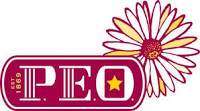 Photo Credit: P.E.O. International
Photo Credit: P.E.O. InternationalChapter IW (Horseshoe Bay) of the P.E.O. Sisterhood has awarded three $1,500 grants to Texas State graduate students through its Program for Continuing Education. P.E.O. stands for Philanthropic Educational Organization, and its mission is to support educational opportunities for women. The Program for Continuing Education provides need-based grants to women whose education has been interrupted (at least 2 years as a non-student) and who return to school to complete a degree that improves their marketable skills for employment. This is the first time students from Texas State have applied for and received these grants. The three recipients are as follows:
Monica Swift – OWLS
Jane Heffelfinger – History
Dana Minney – Family & Child Studies
Congratulations to these students and thank you to Dr. Andrea Hilkovitz, research coordinator in The Graduate College, for working with these students!
-
Graduate House of Representatives - Round Rock OWLS Representative
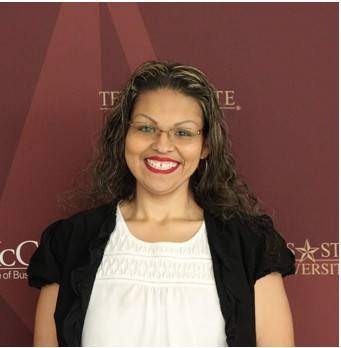
Jessica Ramos-Karmaker is a graduate student at the Round Rock Campus who has been selected as a member of the Graduate House of Representatives. This is a wonderful honor for her, and she has expressed her excitement at bringing ideas and feedback from Round Rock graduate students.
Since the MSIS and MEd degrees in the OWLS department can be completed in Round Rock, if you have any feedback for her and the Grad House, you can contact her via email at Jessica.ramos@txstate.edu.
There will also be a suggestion box in the Student Services office in the Avery Building should graduate students prefer to leave anonymous suggestions for Jessica.
-
Faculty Research Spotlight: Dr. Shetay Ashford-Hanserd
-
News From the Hill - Dr. Ashford-Hanserd
Grant will encourage STEM studies among underrepresented youth
Dr. Shetay Ashford-Hanserd, assistant professor in Texas State’s Department of Occupational, Workforce and Leadership Studies, received a $299,536 grant from the National Science Foundation INCLUDES (Inclusion across the Nation of Communities of Learners of Underrepresented Discoverers in Engineering and Science) program. Her research team will develop a collaborative project to prepare historically underrepresented youth to pursue undergraduate science, technology, engineering, and mathematics (STEM) degrees. Under the Association of Collaborative Communities Equipping Youth for STEM Success program, Dr. Ashford will work with San Marcos-based nonprofits, churches, schools, city offices, and organizations to implement a culturally relevant learning model.
-
Adjunct Faculty - Invited to Project MALES
With his work at Texas State University with minority males and his lecturer appointment within the OWLS department, Dr. Michael E. Nava has been invited to be a part of the Project MALES (Mentoring to Achieve Latino Educational Success) Research Institute as a Faculty and Research Affiliate.
He has been involved with Project MALES since 2010 when he worked at UT-Austin within the Division of Diversity and Community Engagement. He helped to design and develop the program as well as their initial research agenda. His association as an Honorary Co-Founder has kept him connected with Project MALES during his time here at Texas State University; including gaining institutional membership for Texas State University into the Texas Education Consortium for Male Students of Color. Just recently, he was also asked to be a member of the Consortium's Advisory Council.
-
Conversation re: #ReclaimDunbar Community Project
#ReclaimDunbar community engaged project (See attachment), which supports an effort to form a Dunbar Arts, Cultural, and Innovation District in San Marcos. This effort was birth out of Dr. Shetay Ashford-Hanserd participation in a community-driven effort to restore the old First Baptist Church NBC (i.e., Historic First Baptist Church Restoration Project
Community Impact News: Group seeks to turn historically black Dunbar neighborhood in San Marcos into official cultural district
-
College Credit for Heroes Grant accelerates Veteran Degree Program
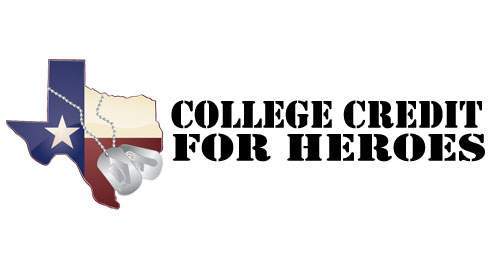
-
New Course: Civic Engagement as Global Citizenship
The Department of Occupational, Workforce, and Leadership Studies announces a new course for spring 2019 titled, Civic Engagement as Global Citizenship. Students will engage in innovative approaches to learning about community-based issues within the context of global citizenship. After completing the course, students will be able to understand civic issues from different frames (e.g., social, economic, political, etc.), assess a civic issue to propose alternative interventions, and extend an issue to regional, state, national, and global levels.
For further information, please contact Dr. Omar S. Lopez, Associate Professor in the Department of Occupational, Workforce, and Leadership Studies via email ol14@txstate.edu.
-
Veterans Program gives college credit for military experience
Texas State’s partnership with College Credit for Heroes is giving service members the ability to earn college credit for skills learned in the military.
The program, created by the Texas Legislature in 2011, accelerates the rate at which military members obtain their college degree, workforce certificate or licensing program. Texas State offers the ability to gain up to 30 credit hours from non-collegiate training and 24 hours of work-life credits toward a Bachelor of Applied Arts and sciences degree. Paths include various disciplines ranging from engineering technology to social services.
Todd Sherron, coordinator for Prior Learning Assessment Program, a competency-based portfolio builder, said the program at Texas State is funded by the Texas Workforce Commission. This allows the school to pay participants for prior learning assessments or internships.
“College-level learning can take place in a lot of different places and it does not have to be in a classroom or even in a university,” Sherron said. “These veterans have thousands of hours of military training as well as years of experience of working and doing their job. It makes no sense to put this type of person through traditional programs.”
The program has space for up to 40 students but only 19 have participated since 2016. The average student age is 36 years old, according to Sherron.
David Beadle, alumnus of the program, said ensuring service members receive a degree in a timely manner is essential.
“(The program) is a benefit many veterans need in order to help assist them in achieving their goals and finishing school,” Beadle said. “I have already recommended several others to look into the program.”
Brigitte Flynt, program director at College Credit for Heroes, said the program began after the Iraq War. Service members wanted to enter the workforce with new careers but were held back by not having a degree or certification.
“The program is very popular with over 40,500 evaluation requests because military members can get into the civilian workforce faster,” Flynt said. “Their degrees are completed sooner because they get the military credit. It’s a win-win for the students.”
For admittance into the program, students must request an evaluation of military education and workforce experience at collegecreditforheroes.org. Texas State requires an online information session before students can meet with an academic advisor following an acceptance to the university.
-
OWLS Graduate Research Assistants present at the 10th Annual International Research Conference
Graduate Research Assistants, Michael Paul Gutiérrez Mannix and Mairi P. Vannella presented a paper entitled “Factors that Influence Persistence Among Students of Color in K-16 STEM Education” at the 10th Annual International Research Conference for Graduate Students at Texas State University on Wednesday, November 14, 2018.
This work is part of the NSF-funded project- ACCEYSS (Association of Collaborative Communities Equipping Youth for STEM Success), which is spearheaded by principal investigator, Dr. Shetay Ashford
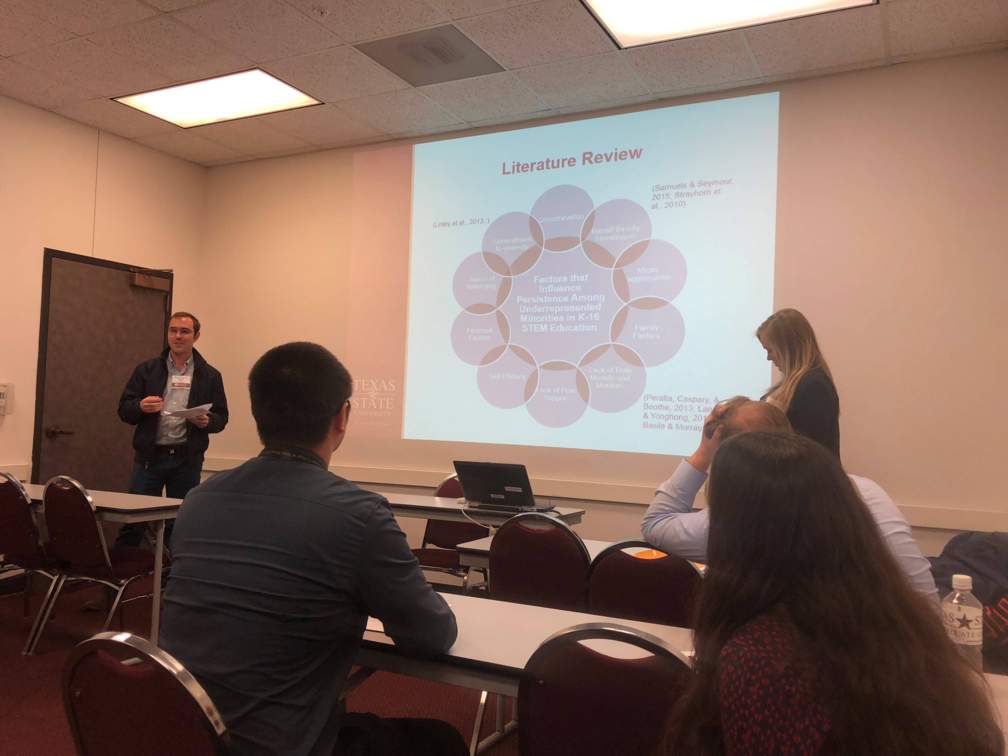
-
Per Course Faculty, Dr. Brett Lee, interviewed for his research
Study: Teachers Use Crowdfunding Sites to Make Up for Budget Shortfalls
By Sarah Schwartz on November 29, 2018 4:05 PM
For teachers, crowdfunding has became a go-to method for financing hands-on projects, planning class trips, and outfitting classrooms—four out of five public schools in the U.S. have at least one teacher who has listed a project on the teacher-crowfunding site DonorsChoose.org, according to the nonprofit.
New research from Texas State University offers a closer look at what factors lead a teacher to list a project—and how educators may be shifting their instructional priorities to become more marketable on the platform.
In his doctoral dissertation, Brett Lee, now a lecturer at the university, conducted in-depth interviews with 16 teachers and school administrators at four schools in a Texas district. All of the schools had relied heavily on the platform over the course of a decade—each school had raised at least $25,000 through the site from 2006 to 2017.
Many of these teachers drew a direct line from budget cuts to crowdfunding. A smaller stream of money to their districts meant fewer funds for updated or supplementary materials, interviewees said. One teacher said that she turned to DonorsChoose amid deep cuts to Texas's school spending in 2011, and that the ongoing effects of that state funding decision have kept her on the platform.
"Sadly, it seems that the responsibility to close the funding sinkhole trickles down from the district, to the campus, to the classroom teacher," said Lee, in an email. "Most of the teachers admitted to previously spending thousands of dollars of their own income."
School administrators were largely supportive of their teachers using DonorsChoose, in some cases even promoting the site. One administrator included links to match offers on the platform in a weekly newsletter to staff, while two of the four schools in the study offered crowdfunding professional development. At one of these schools, the PD was mandatory for teachers who had not yet launched a DonorsChoose campaign.
Teachers also said equity for their students was a driving goal. Of all of the schools in the district, the most frequent and successful DonorsChoose users had large populations of students from low-income households. The four schools in the study were all classified as Title I.
"Within these schools, the parents and parent-teacher organizations do not have the same amount of fiscal leverage to meet the needs of their respective campuses," said Lee. "Simply put, as the budgets shrink statewide, the campuses that 'have-not' have to look to innovation to make up for education budget shortfalls."
One teacher described her reason for using the platform: "There's another school here and it's on the west side and it's mostly white, and they have a lot of money. [That teacher's] budget was $25,000, because she gets district money and then she does fundraising, and the parents buy products, and they had $25,000. My budget is $2,000. Why should my kids have less? ... [S]o I'm gonna hustle."
Teachers were mostly likely to post requests for classroom technology to replace outdated or broken tools, new books (especially culturally relevant titles that they couldn't find in school libraries), and personal items like food and hygiene supplies for students who couldn't afford them. If their projects were funded, teachers often shared their materials across classrooms in the building.
How Teachers 'Sell' Projects
But successful crowdfunding also requires marketing—in order to get these projects funded, teachers had to design projects that would be appealing to donors.
Teachers researched other projects that had been fulfilled, making stylistic and tactical changes to their proposals as a result. Teachers said that they tried to keep costs relatively low—between $200-$500—as projects with more modest goals tend to be more likely to get fully funded.
In other cases, teachers created projects designed to be eligible for matching funds from companies and foundations. For example, one teacher said, if there's an organization offering matching contributions for science materials, she'll submit a proposal for science materials.
Sometimes, this means that companies play a part in shaping the topics that teachers cover. One teacher, after researching match offers, discovered that the bank Charles Schwab was funding projects related to financial literacy.
"I made sure that my resources fit the criteria and then my description of how the students and why they needed it was really to what the company wanted," she said. "It wasn't something that I thought off the top of my head like, 'Hey, my students really need this,' but I saw the match and I thought, 'Oh, this would great.' "
Even so, Lee said, teachers didn't express concern that tailoring their requests in this way would limit or dictate what they could do in the classroom. Requirements for matching funds are generally rather broad, he said.
-
TXST/Calaboose Collaboration "Share & Celebrate" Event - Calaboose African American History Museum
The following TXST Geography class presentations have taken place at the Calaboose African American History Museum from 5:00 pm – 6:30 pm on December 5, 2018. These activities were facilitated by colleagues, Drs. Colleen Myles and Eric Sarmiento, as part of the#ReclaimDunbar: Reclaiming the Lived Experiences and Lost Assets of the Dunbar Community research project. The students will share historical mappings of US Census Bureau data from the 1930s/1940s and a Dunbar neighborhood walking tour.
TXST/Calaboose Collaboration “Share & Celebrate”Event
Wed, Dec 5, 5-6:30 PM, Calaboose African American History Museum
Join TXST Geography students from the Fall 2018Interpretive Environmental Geography and Managing Urbanization classes
as they share – and celebrate! - the work they have done with our community partner, the Calaboose Museum.
-
OWLS Faculty Honored by Alpha Chi National Honor Society
Dr. Cherrstrom and Dr. Ashford-Hanserd were honored as Alpha Chi National Honor Society’s Favorite Professors for 2018 on December 4, 2018.
Alpha Chi is a national honor society which promotes academic excellence and exemplary character among undergraduate college and university students and honors those who achieve such distinction. To qualify for membership, a student must be a first-time undergraduate, a junior or senior (having attained no less than 60 credit hours), have a minimum Texas State GPA of 3.50 on at least 45 semester hours at Texas State. Graduate students with a 4.0 and at least 15 hours of graduate course-work at Texas State also qualify for Alpha Chi membership. Alpha Chi is the oldest honor society at Texas State, founded in 1922. Membership in the honor society is indicated on the student’s transcript. -
OWLS Faculty receiving award at Veterans Graduation Reception
Dr. Boden is the Faculty Recipient of the Veterans Alliance of Texas State Above and Beyond Award for her outstanding contributions and dedications to supporting student veterans at Texas State University. The award will be presented at the Veterans Graduation Reception.
Veterans Graduation Reception recognizes the academic achievements and contributions of student veterans at Texas State.
This program is supported by the Office of Student Diversity and Inclusion, Vice President for Student Affairs, Veterans Initiative, Veterans Affairs Office, Veterans Initiative and Veterans Alliance of Texas State.
-
OWLS Faculty & GRA research at Adult Higher Education Alliance
Protective Factors to Foster Resiliency in Healthcare Professional
Trainees Carrie Boden, Wendy L. Ward, and Lindsey Wilson
42nd Annual Conference Proceedings
Hosted by
The UCF College of Education and Human Performance
The Morgridge International Reading Center
University of Central Florida, Orlando, FL
March 8-9, 2018
Abstract
High stress levels and burnout are common in the healthcare field today. Healthcare professionals (HCP) can protect themselves by remaining cognizant of preventive and intervention strategies to utilize when stress levels are threatening burnout. Within one’s professional identity, developing resiliency skills and actively practicing self-care are some strategies that are helpful in maintaining effective work performance and patient care. To develop and recognize these skills, HCPs undergoing transformational learning (TL) can develop new ways of thinking, acting, and feeling in their work and everyday life to help prevent burnout (Transformative Learning Centre, 2004). Keywords: Transformative Learning, Healthcare Professional, Community of Practice, Adult, Resilience
Read the full excerpt at the following link:
